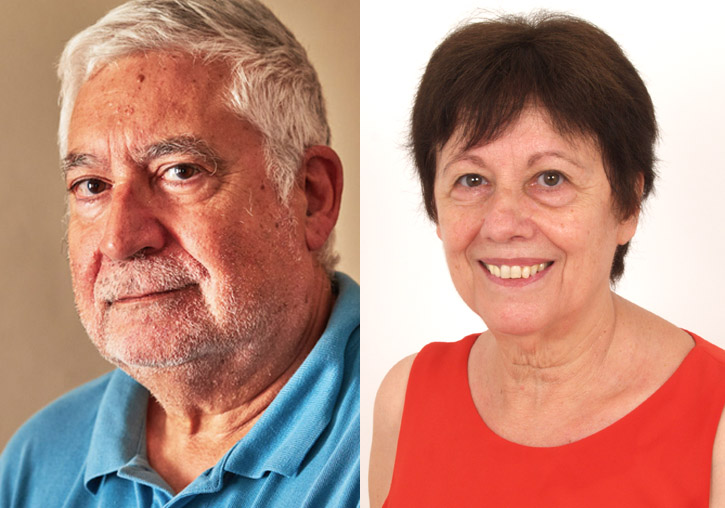
The Honorary Professor of the Universitat de València Maria Conca, and the essayist and editor Gustau Muñoz have been granted the Vicent Ventura Award 2020. The award was founded by the Universitat de València to honout the memory of the journalist, politician and civic fighter Vicent Vertura, who died in 1998. The award will be given on 31 March at 19:00 in the Aula Magna of the Cultural Centre La Nau of the Universitat de València.
This prize is granted to persons or groups that have distinguished themselves by their civic and democratic trajectory and their commitment with the Valencian culture and language. The organising committee and jury of the award is formed by the Universitat de València, the Universitat Jaume I, people who had a close relationship with Vicent Ventura, CCOO, Intersindical Valenciana, UGT, the Unió de Llauradors i Ramaders and the Unió de Periodistes Valencians.
Vicent Ventura (Castelló de la Plana, 1924-València, 1998) co-founded the Partit Socialista del País Valencià and the CCOO union of the Valencian Community. Socialist and nationalist, he took part in 1962 in a meeting of democrats in Munich, which cost him the exile and confinement. When he returned to Valencia he found the gates barred to work as journalist and founded an advertising agency. In 1995 Ventura received the Medal of the Universitat de València. The academic body has edited a collection of Ventura's articles under the title ‘Un home de combat’.
Maria Conca
Maria Conca (Beneixama, l’Alcoià, 1948) is a Lecturer in Catalan Philology, member of the Inter-university Institute for Valencian Language (IIFV) and ex-director of the Unit for Multilingual Education of the Universitat de València (UEM-UV). She was professor, now retired as honorary, of the Universitat de València. Her research stands out in three fields: education and sociolinguistics, historic memory, philology and applied linguistics. The latter is the main field of her research, especially the field of phraseology.
n the 70’s, she encouraged the Partit Socialista d’Alliberament Nacional (National Liberation’s Socialist Party, PSAN) in the Valencian Country and she worked hardly in the teachers’ movement and the Escoles d’Estiu association. She has taken part in the fight of the neighbourhood associations and the feminist movement. Due to her political activity, has suffered assaults, detentions and trial.
She wrote: Paremiologia’ (1987), ‘Els refranys catalans’ (1988) and, with collaboration, ‘Escola i llengua al País Valencià’ (1976), ‘Els primers reculls de proverbis catalans’ (1996), ‘Text i gramàtica’ (1998) and ‘La fraseologia. Principis, mètode i aplicacions’(2014). She has also published works about literary style of Enric Valor, Vicent Andrés Estellés, Carme Riera, Joan Fuster and Josep Pla.
Gustau Muñoz
Gustau Muñoz (Valencia, 1951), an economist by training, is a translator, essayist and co-director of the magazine 'L'Espill'. Throughout his professional career he has translated around 60 books from German, English, French and Italian into both Spanish and Catalan. From 1985 to 1998, he worked as an editor at the Institución Valenciana de Estudios e Investigación (IAM), where he was the editor-in-chief of the magazine 'Debats', and from 1998 to 2016 at Publicacions de la Universitat de València (PUV), where he was in charge of book collections such as 'Assaig' and 'Breviaris' and, especially, of the periodical publications 'L'Espill', 'Pasajes', 'Caràcters' and 'Transfer'. He has also been a professor at the Faculty of Economics.
Author of the books ‘Intervencions, entre cultura i política’ (1999), ‘A l’inici del segle. Un dietari de reflexions’ (2002), ‘Herència d’una època’ (2006), ‘Corrents de fons’ (2019), ‘La vida dels llibres’ (2019) i ‘El vertigen dels dies. Notes per a un dietari’(2019). He has also coordinated, among others, the collective volumes 'Els reaccionaris valencians' (Afers, 2010) and 'El Magnànim: setanta anys de cultura valenciana' (2019). He currently collaborates in media such as L’Avenç, El Temps and eldiario.es. On the other hand, he has had a long political and civic career, in the PCPV and the UPV, as well as in the civic platforms País Valencià i Democràcia, and Valencians pel Canvi.
















